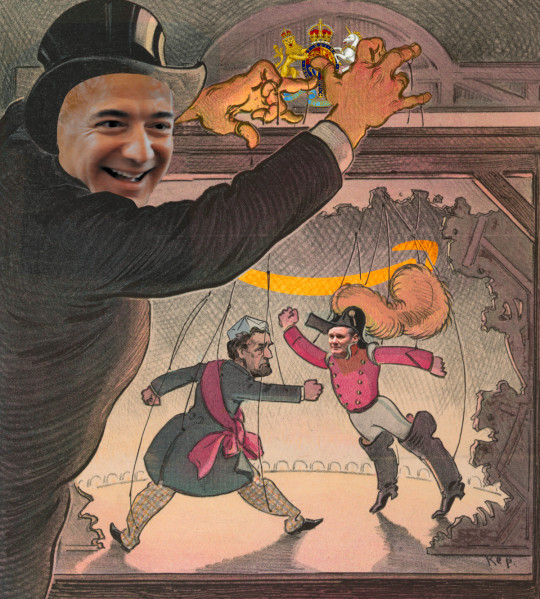#competitors' pricing strategies
Explore tagged Tumblr posts
Text
Explore how artificial intelligence can revolutionize pricing strategies for hotel suppliers. Learn to optimize rates, monitor market trends, and maintain a competitive edge effortlessly.
#AI-Driven Price Intelligence#Price Intelligence#dynamic pricing strategy#price points#Hotel Pricing Intelligence#AI Price intelligence tools#Competitor Pricing#competitors' pricing strategies#competitor price monitoring#Pricing Strategy#pricing history#AI Tools#AI pricing#price monitoring tools
0 notes
Text
#automated data extraction#web scraping services#analyze competitor pricing strategies#analyze property demand#AI for advanced data insights
0 notes
Text
Integer Holdings Stock Alert: Is It Time to Sell as Prices Near All-Time Highs?
Is Integer Holdings Corporation a smart investment or a risk not worth taking? Explore our comprehensive analysis of Integer's price forecast #IntegerHoldingsCorporation #ITGR #StockPriceForecast #InvestmentAdvice #MarketAnalysis #OvervaluedStocks #EquityRiskPremium #InvestmentStrategy
Integer Holdings Corporation, a prominent name in the medical device manufacturing industry, has captured investors’ attention with its recent financial performances and market activities. But is this company a hidden gem poised for growth, or is it teetering on the edge of a decline? In this deep dive, we unravel the complexities of Integer’s financial health, market position, and future…
#Competitor comparison#Equity risk premium#Financial performance#Investment#Investment advice#Investment Insights#Investment strategy#ITGR#Market Analysis#Medical Device Manufacturing#Overvalued Stocks#Stock Forecast#Stock Insights#Stock Price Forecast
0 notes
Text
How to Spy on Your Etsy Competitors and Outrank Them in Searches
In this guide, we will break down how to analyze your rivals, perform keyword research, and leverage the best Etsy seller tools to improve your rankings and boost your sales.
#Etsy research#Etsy SEO#competitor analysis#keyword research#eRank#Marmalead#Alura#seller tools#pricing strategy#shop optimization#conversion tips#handmade seller#Etsy growth#Etsy success
0 notes
Text
Discover how competition-based pricing can drive success by aligning your prices with market trends. This blog explains key strategies like pricing above, below, or matching competitors to enhance profitability and customer trust.
#Competition Based Pricing#competitive pricing engine#competitor based pricing#competitive based pricing#competition pricing#competitor pricing#pricing strategy
0 notes
Text
From Data to Action: Using Competitor Price Monitoring to Drive Business Decisions
In today’s hyper-competitive business landscape, staying ahead of your competitors requires more than just offering quality products or services. It demands a keen understanding of the market, and crucially, an insight into your competitors' pricing strategies. Competitor price monitoring is a powerful tool that can transform raw data into actionable business intelligence, guiding your decisions to enhance competitiveness, profitability, and market positioning.
Understanding Competitor Price Monitoring
Monitoring competitor prices involves systematically tracking and analyzing the prices of your competitors’ products and services. This practice provides businesses with a wealth of information that can be used to make informed strategic decisions. Effective price monitoring goes beyond simple price comparisons; it involves understanding the nuances of competitors’ pricing strategies, including discounts, promotions, and price adjustments over time.
The Importance of Competitor Price Monitoring
1. Informed Pricing Strategies
One of the primary benefits of competitor price monitoring is the ability to set informed pricing strategies. By understanding how competitors price their products, businesses can strategically position their offerings to attract customers. For example, if a competitor lowers their prices, a company might decide to adjust their prices to maintain competitiveness or highlight the superior quality or unique features of their higher-priced products.
2. Enhanced Market Positioning
Monitoring competitor prices allows businesses to better understand their market positioning. It helps identify where they stand in the competitive landscape and informs decisions on whether to position themselves as a premium provider, a cost leader, or somewhere in between. This positioning is critical in defining the company’s brand and attracting the right customer segments.
3. Improved Profit Margins
By analyzing competitor pricing data, businesses can identify opportunities to optimize their profit margins. For instance, if competitors are consistently pricing products higher than your own, it might indicate an opportunity to increase prices without losing market share. Conversely, if competitors are undercutting prices, it might be necessary to find ways to reduce costs or add value to justify higher prices.
4. Proactive Decision-Making
Competitor price monitoring enables proactive decision-making. Rather than reacting to market changes after they happen, businesses can anticipate shifts and adjust their strategies accordingly. This foresight is invaluable in maintaining a competitive edge and ensuring that business decisions are based on current market realities.

Implementing Competitor Price Monitoring
To effectively monitor competitor prices, businesses need a structured approach that involves the right tools, methodologies, and analytical frameworks. Here’s a step-by-step guide to implementing a robust competitor price monitoring system:
1. Identify Key Competitors
The first step is to identify which competitors to monitor. This selection should include direct competitors who offer similar products or services, as well as indirect competitors whose offerings serve as substitutes. Analyzing a broad range of competitors provides a comprehensive view of the market.
2. Select the Right Tools
There are various tools available for competitor price monitoring, ranging from simple web scraping tools to sophisticated pricing intelligence platforms. These tools can automate the process of collecting pricing data from competitors’ websites, marketplaces, and other online sources. Some advanced platforms also offer features like historical price tracking, trend analysis, and predictive analytics.
3. Gather Data Regularly
Competitor prices can change frequently, especially in dynamic markets. Regular data collection is essential to capture these changes and ensure that the analysis is based on up-to-date information. Depending on the industry and market conditions, data collection might be required daily, weekly, or monthly.
4. Analyze the Data
Once the data is collected, the next step is analysis. This involves comparing prices across competitors, identifying trends, and understanding the context behind price changes. For example, a competitor’s price drop might be due to a promotional campaign or a response to excess inventory.
5. Translate Data into Actionable Insights
The ultimate goal of competitor price monitoring is to translate data into actionable insights. This requires interpreting the data in the context of your business objectives and market conditions. Insights might include identifying opportunities for price adjustments, understanding the impact of competitor pricing on sales, or recognizing the need for strategic changes in product offerings.
Best Practices for Effective Competitor Price Monitoring
1. Focus on Relevant Metrics
Not all pricing data is equally valuable. Focus on metrics that are most relevant to your business, such as the prices of key products, frequency of price changes, and the duration of promotional periods. This targeted approach ensures that your analysis is focused and actionable.
2. Use Advanced Analytics
Leverage advanced analytics to gain deeper insights from the data. Machine learning algorithms can help identify patterns and predict future price movements, while visualization tools can make it easier to interpret complex data sets. Advanced analytics can also highlight correlations between competitor pricing and your own sales performance.
3. Maintain Data Accuracy
Accurate data is the foundation of effective price monitoring. Ensure that the tools and methods you use for data collection are reliable and that the data is regularly updated. Inaccurate or outdated data can lead to flawed analysis and misguided decisions.
4. Integrate with Other Data Sources
Competitor price monitoring should not be done in isolation. Integrate pricing data with other data sources, such as sales data, customer feedback, and market trends. This holistic approach provides a more comprehensive understanding of the factors influencing your market and enhances the quality of your insights.
5. Regularly Review and Adjust Strategies
The market is constantly evolving, and so should your pricing strategies. Regularly review the insights gained from competitor price monitoring and adjust your strategies accordingly. This continuous improvement approach ensures that your pricing remains competitive and aligned with market conditions.
Also Read: The importance of monitoring your competitor’s prices
Challenges and Considerations
While competitor price monitoring offers significant benefits, it also comes with challenges that businesses need to address:
1. Data Overload
With the vast amount of pricing data available, businesses can easily become overwhelmed. It’s important to focus on the most relevant data and use analytical tools to manage and interpret large data sets effectively.
2. Ethical Considerations
Competitor price monitoring should be done ethically and within the bounds of the law. Avoid practices that could be considered unfair competition or that violate data privacy regulations.
3. Market Dynamics
The effectiveness of price monitoring can be influenced by market dynamics such as price wars, regulatory changes, and economic conditions. Businesses need to be agile and ready to adapt their strategies in response to these changes.

Conclusion
Competitor price monitoring is a powerful tool that can transform data into actionable business intelligence. By systematically tracking and analyzing competitor prices, businesses can make informed decisions that enhance their competitiveness, profitability, and market positioning. From refining pricing strategies to optimizing profit margins and improving market positioning, the insights gained from competitor price monitoring are invaluable in today’s competitive landscape.
Implementing an effective competitor price monitoring system requires the right tools, methodologies, and analytical frameworks. By focusing on relevant metrics, using advanced analytics, maintaining data accuracy, integrating with other data sources, and regularly reviewing strategies, businesses can harness the full potential of price monitoring to drive strategic decision-making.
As demonstrated by real-world case studies, businesses across various industries have successfully used competitor price monitoring to achieve significant improvements in sales, market share, and revenue. While challenges exist, a structured and ethical approach to price monitoring can provide a significant competitive advantage.
In conclusion, turning data into action through competitor price monitoring is not just a tactical advantage—it’s a strategic imperative in today’s fast-paced business environment. By staying informed about competitors’ pricing strategies and making data-driven decisions, businesses can position themselves for long-term success and sustained growth.
Source: https://productpricingstrategy.blogspot.com/2024/05/using-competitor-price-monitoring-to-drive-business-decisions.html
#Competitive Pricing Analysis#Competitor Price Monitoring#Market Positioning#Price Intelligence#Pricing Strategies#EcomNext
0 notes
Text
Make your Restaurant more competitive with Foodspark Competitor Price Monitoring service. You can develop effective pricing strategies and gain a strong market position using restaurant data analytics, menu trends, and industry insights.
#food data scraping services#restaurant data scraping#food data scraping#grocerydatascraping#zomato api#web scraping services#restaurantdataextraction#fooddatascrapingservices#grocerydatascrapingapi#Competitor Price Monitoring Strategies#Competitor Price Monitoring service
0 notes
Text
The one weird monopoly trick that gave us Walmart and Amazon and killed Main Street

I'm coming to BURNING MAN! On TUESDAY (Aug 27) at 1PM, I'm giving a talk called "DISENSHITTIFY OR DIE!" at PALENQUE NORTE (7&E). On WEDNESDAY (Aug 28) at NOON, I'm doing a "Talking Caterpillar" Q&A at LIMINAL LABS (830&C).

Walmart didn't just happen. The rise of Walmart – and Amazon, its online successor – was the result of a specific policy choice, the decision by the Reagan administration not to enforce a key antitrust law. Walmart may have been founded by Sam Walton, but its success (and the demise of the American Main Street) are down to Reaganomics.
The law that Reagan neutered? The Robinson-Patman Act, a very boring-sounding law that makes it illegal for powerful companies (like Walmart) to demand preferential pricing from their suppliers (farmers, packaged goods makers, meat producers, etc). The idea here is straightforward. A company like Walmart is a powerful buyer (a "monopsonist" – compare with "monopolist," a powerful seller). That means that they can demand deep discounts from suppliers. Smaller stores – the mom and pop store on your Main Street – don't have the clout to demand those discounts. Worse, because those buyers are weak, the sellers – packaged goods companies, agribusiness cartels, Big Meat – can actually charge them more to make up for the losses they're taking in selling below cost to Walmart.
Reagan ordered his antitrust cops to stop enforcing Robinson-Patman, which was a huge giveaway to big business. Of course, that's not how Reagan framed it: He called Robinson-Patman a declaration of "war on low prices," because it prevented big companies from using their buying power to squeeze huge discounts. Reagan's court sorcerers/economists asserted that if Walmart could get goods at lower prices, they would sell goods at lower prices.
Which was true…up to a point. Because preferential discounting (offering better discounts to bigger customers) creates a structural advantage over smaller businesses, it meant that big box stores would eventually eliminate virtually all of their smaller competitors. That's exactly what happened: downtowns withered, suburban big boxes grew. Spending that would have formerly stayed in the community was whisked away to corporate headquarters. These corporate HQs were inevitably located in "onshore-offshore" tax haven states, meaning they were barely taxed at the state level. That left plenty of money in these big companies' coffers to spend on funny accountants who'd help them avoid federal taxes, too. That's another structural advantage the big box stores had over the mom-and-pops: not only did they get their inventory at below-cost discounts, they didn't have to pay tax on the profits, either.
MBA programs actually teach this as a strategy to pursue: they usually refer to Amazon's "flywheel" where lower prices bring in more customers which allows them to demand even lower prices:
https://www.youtube.com/watch?v=BaSwWYemLek
You might have heard about rural and inner-city "food deserts," where all the independent grocery stores have shuttered, leaving behind nothing but dollar stores? These are the direct product of the decision not to enforce Robinson-Patman. Dollar stores target working class neighborhoods with functional, beloved local grocers. They open multiple dollar stores nearby (nearly all the dollar stores you see are owned by one of two conglomerates, no matter what the sign over the door says). They price goods below cost and pay for high levels of staffing, draining business off the community grocery store until it collapses. Then, all the dollar stores except one close and the remaining store fires most of its staff (working at a dollar store is incredibly dangerous, thanks to low staffing levels that make them easy targets for armed robbers). Then, they jack up prices, selling goods in "cheater" sizes that are smaller than the normal retail packaging, and which are only made available to large dollar store conglomerates:
https://pluralistic.net/2023/03/27/walmarts-jackals/#cheater-sizes
Writing in The American Prospect, Max M Miller and Bryce Tuttle1 – a current and a former staffer for FTC Commissioner Alvaro Bedoya – write about the long shadow cast by Reagan's decision to put Robinson-Patman in mothballs:
https://prospect.org/economy/2024-08-13-stopping-excessive-market-power-monopoly/
They tell the story of Robinson-Patman's origins in 1936, when A&P was using preferential discounts to destroy the independent grocery sector and endanger the American food system. A&P didn't just demand preferential discounts from its suppliers; it also charged them a fortune to be displayed on its shelves, an early version of Amazon's $38b/year payola system:
https://pluralistic.net/2022/11/28/enshittification/#relentless-payola
They point out that Robinson-Patman didn't really need to be enacted; America already had an antitrust law that banned this conduct: section 2 of the the Clayton Act, which was passed in 1914. But for decades, the US courts refused to interpret the Clayton Act according to its plain meaning, with judges tying themselves in knots to insist that the law couldn't possibly mean what it said. Robinson-Patman was one of a series of antitrust laws that Congress passed in a bid to explain in words so small even federal judges could understand them that the purpose of American antitrust law was to keep corporations weak:
https://pluralistic.net/2023/04/14/aiming-at-dollars/#not-men
Both the Clayton Act and Robinson-Patman reject the argument that it's OK to let monopolies form and come to dominate critical sectors of the American economy based on the theoretical possibility that this will lead to lower prices. They reject this idea first as a legal matter. We don't let giant corporations victimize small businesses and their suppliers just because that might help someone else.
Beyond this, there's the realpolitik of monopoly. Yes, companies could pass lower costs on to customers, but will they? Look at Amazon: the company takes $0.45-$0.51 out of every dollar that its sellers earn, and requires them to offer their lowest price on Amazon. No one has a 45-51% margin, so every seller jacks up their prices on Amazon, but you don't notice it, because Amazon forces them to jack up prices everywhere else:
https://pluralistic.net/2024/03/01/managerial-discretion/#junk-fees
The Robinson-Patman Act did important work, and its absence led to many of the horribles we're living through today. This week on his Peoples & Things podcast, Lee Vinsel talked with Benjamin Waterhouse about his new book, One Day I’ll Work for Myself: The Dream and Delusion That Conquered America:
https://athenaeum.vt.domains/peoplesandthings/2024/08/12/78-benjamin-c-waterhouse-on-one-day-ill-work-for-myself-the-dream-and-delusion-that-conquered-america/
Towards the end of the discussion, Vinsel and Waterhouse turn to Robinson-Patman, its author, Wright Patman, and the politics of small business in America. They point out – correctly – that Wright Patman was something of a creep, a "Dixiecrat" (southern Democrat) who was either an ideological segregationist or someone who didn't mind supporting segregation irrespective of his beliefs.
That's a valid critique of Wright Patman, but it's got little bearing on the substance and history of the law that bears his name, the Robinson-Patman Act. Vinsel and Waterhouse get into that as well, and while they made some good points that I wholeheartedly agreed with, I fiercely disagree with the conclusion they drew from these points.
Vinsel and Waterhouse point out (again, correctly) that small businesses have a long history of supporting reactionary causes and attacking workers' rights – associations of small businesses, small women-owned business, and small minority-owned businesses were all in on opposition to minimum wages and other key labor causes.
But while this is all true, that doesn't make Robinson-Patman a reactionary law, or bad for workers. The point of protecting small businesses from the predatory practices of large firms is to maintain an American economy where business can't trump workers or government. Large companies are literally ungovernable: they have gigantic war-chests they can spend lobbying governments and corrupting the political process, and concentrated sectors find it comparatively easy to come together to decide on a single lobbying position and then make it reality.
As Vinsel and Waterhouse discuss, US big business has traditionally hated small business. They recount a notorious and telling anaecdote about the editor of the Chamber of Commerce magazine asking his boss if he could include coverage of small businesses, given the many small business owners who belonged to the Chamber, only to be told, "Over my dead body." Why did – why does – big business hate small business so much? Because small businesses wreck the game. If they are included in hearings, notices of inquiry, or just given a vote on what the Chamber of Commerce will lobby for with their membership dollars, they will ask for things that break with the big business lobbying consensus.
That's why we should like small business. Not because small business owners are incapable of being petty tyrants, but because whatever else, they will be petty. They won't be able to hire million-dollar-a-month union-busting law-firms, they won't be able to bribe Congress to pass favorable laws, they can't capture their regulators with juicy offers of sweet jobs after their government service ends.
Vinsel and Waterhouse point out that many large firms emerged during the era in which Robinson-Patman was in force, but that misunderstands the purpose of Robinson-Patman: it wasn't designed to prevent any large businesses from emerging. There are some capital-intensive sectors (say, chip fabrication) where the minimum size for doing anything is pretty damned big.
As Miller and Tuttle write:
The goal of RPA was not to create a permanent Jeffersonian agrarian republic of exclusively small businesses. It was to preserve a diverse economy of big and small businesses. Congress recognized that the needs of communities and people—whether in their role as consumers, business owners, or workers—are varied and diverse. A handful of large chains would never be able to meet all those needs in every community, especially if they are granted pricing power.
The fight against monopoly is only secondarily a fight between small businesses and giant ones. It's foundationally a fight about whether corporations should have so much power that they are too big to fail, too big to jail, and too big to care.

Community voting for SXSW is live! If you wanna hear RIDA QADRI and me talk about how GIG WORKERS can DISENSHITTIFY their jobs with INTEROPERABILITY, VOTE FOR THIS ONE!

If you'd like an essay-formatted version of this post to read or share, here's a link to it on pluralistic.net, my surveillance-free, ad-free, tracker-free blog:
https://pluralistic.net/2024/08/14/the-price-is-wright/#enforcement-priorities
#pluralistic#Robinson-Patman Act#ftc#alvaro bedoya#monopoly#monopsony#main street#too big to jail#too big to care#impunity#regulatory capture#prices#the american prospect#Max M Miller#Bryce Tuttle#a and p#wright patman
2K notes
·
View notes
Text
Discover how AI-powered analytics, real-time competitor monitoring, and predictive insights are revolutionizing marketplace intelligence. Learn how businesses can leverage dynamic pricing, demand forecasting, and external data integration to stay competitive and maximize revenue. Stay ahead in the fast-evolving eCommerce landscape with cutting-edge intelligence strategies!
#competitor price tracking#product matching#price monitoring#price intelligence#price matching#Marketplace Intelligence#competitor pricing#competitor tracking#AI-driven intelligence tools#Monitoring competitor prices#Data Analysis#Dynamic Pricing#AI-Driven Competitive Analysis#Business intelligence#Pricing Intelligence#smart pricing#pricing strategies
0 notes
Text
#real estate data scraping services#extract property details#Zillow scraper#track competitor pricing strategies
0 notes
Text
Corteva Inc.'s Overinflated Stock Price: A Risky Bet for Your Portfolio
Discover why experts advise selling Corteva Inc. stock now. Uncover the risks of an overinflated stock price, explore smarter investment. #Corteva #CTVA #Stockpriceforecasting #Investmentadvice #Negativeinvestmentscorecard #Overinflatedstockprice #Dividendyieldconcerns
Is Corteva Inc. really the agricultural titan it’s perceived to be, or is it a ticking time bomb in your investment portfolio? Despite boasting a global presence and recent stock gains, there’s more beneath the surface that savvy investors need to uncover. Before you make your next move, dive into why holding onto Corteva might be riskier than you think—and discover the alternatives that could…
#Agriculture sector#Alternative investments#Competitor comparison#CTVA#Dividend yield concerns#Financial forecasting#Financial performance#Investment#Investment advice#Investment Insights#Investment Opportunities#Investment strategy#Market Analysis#Negative investment scorecard#Overinflated stock price#Portfolio management#Risk assessment#Savvy investors#Selling shares#Stock Forecast#Stock Insights#Stock Market Insights#Stock price forecasting#The Intelligent Investor principles
0 notes
Text




Things I Have to do for My Sanity
1. Wake up at the first alarm - no snoozing and no going lying around in bed. Getting up straight away and head to the bathroom. It’s going to suck initially but you’ll get used to it in a few days.
2. Mental self care: 30 minute meditation, brain games mental math, reading, news. Knowledge is sexy and don’t deny yourself sexiness.
3. Daily review in my diary at the beginning and end of my day: what went well, what didn’t, what I need to accomplish to achieve my goals. This has tremendously helped my goals and keeping my motivation more consistent, especially at work. Analysing and correcting incremental changes creates long term success.
4. Cleaning up before bed - clothes, shoes, organising my bag, etc. I set a timer for 5 minutes and try to get as much done as possible.
5. Pick out my clothes the night before and steam iron them for the next day.
6. Face masks twice a week, a hair mask once a week, I scrub the soles of my feet with that foot scrubbing thingy once a week. Manicures every month because my nail beds are too sensitive to do it biweekly, iron supplements so that I’m not a moody bitch. Matching underwear to feel good about myself. Lavender spray on my pillow before sleeping so that I don’t get weird dreams.
7. Reading biographies and autobiographies. My mentor had suggested this to me and it’s amazing how literally I don’t have a single original experience - everything I’ve felt or mistakes I’ve made have already been done by someone else.
I’m going to curate a list of business books that I feel that have helped me the most recently.
8. I write a short essay everyday in the language I’m currently learning. I also end my day by talking about my day for at least 2 minutes in that language and I record it in voice memos to keep a track of my progress. I want to be fluent to a level where I can think in this language.
✨
I don’t generally share a lot about my personal life - none of you know my name or where I’m based and I feel comfortable doing that. But I do want to start giving out more insights to what I’m doing personally in my career - the good, the bad, the ugly.
Being self aware and honest to myself has helped me improve a lot. I know that shame is my Achilles heel, so now I’m reading books to combat that. I’ve caved in and decided to try therapy for a bit to see if what I’m doing is useful or not. My first session is tomorrow. Staying disciplined was my initial hurdle but the systems I’ve set (waking up early + habit stacking) have helped me slowly overcome that.
Work side, I’ve started establishing myself publicly more. I don’t want to reveal too much about what I do exactly but the good news is that our biggest competitor has noticed my progress (a former employee of that company came to us for an interview and directly asked our top management about me). It’s been 4 months that I’ve been working here but I know that next year I really have to swing the bat and hit a home run. I’ve decided to work on the field more and less in the office to really understand people’s needs and create unique solutions.
The daily/weekly/quarterly diary is definitely credited to my recent wins. That’s the biggest change I’ve made in my routine and i can already see that it’s working well. I’m going to continue refining and implementing that method.
Recent work methods I’ve decided to start working on (I’m not required to do these but I do it for my growth):
1. I’ve started studying popular companies’ business and revenue models in detail. Everything is adoptable and adaptable, you just have to figure out how to tweak something for your company’s clients and needs. Now I’ve decided that I want to keep a track of our competitors, their business models, their owners names, pricing strategy, their target audience etc etc on an excel sheet so that I’m aware with what’s happening in the market.
2. I’ve started making client profiles. Every time I meet a client, I note down their name, the company name, what they were like, anything specific they seemed to like or want, how much they had paid us for a service, what their paying capacity could be, etc.
#c suite#powerful woman#strong women#ceo aesthetic#personal growth#that girl#productivity#getting your life together#balance#to do#to do list
1K notes
·
View notes
Text
Cash Slave, reporting in...

Good morning, master. State Trooper Hernandez reporting!
I hope you're doing well since the last time we saw each other. Again, I can't apologize enough for pulling you over on the highway. I had no idea you were such an amazing hypnotist. Thank you again for letting me get off easy and only making me taze myself twice! I was paralyzed in that muddy ditch for awhile, but you could've given me a helluva worse punishment!
Your instructions aren't negotiable, so I made sure to snap a photo before I started my shift today. As you suggested, I've been eating a box of donuts every morning, and I've packed on a hefty 30 lbs since I've started. My wife has complained, but I know you want me to look more like a cliche of law enforcement!
I'll stop by your house to drop off my paycheck tonight after work. I won't forget to pick up some pizza for you and your friends on the way: extra sausage, just like you said!
See you tonight, master!

Hello sir.
It's been a week since you came into my shop, and I've followed everything you said. I didn't agree with it at first, but you convinced me with that little pendant.
You were right! I really am beneath powerful men like you. Filthy blue-collar workers aren't worthy to lick the dirt off your shoes. You were right to point that out, and you were right to tell me to embrace it. When the world looks at me, they shouldn't see a man. They should see a grease monkey at the bottom of society.
That's why I haven't showered or changed in seven days. My BO is uncomfortable to work in, but I know it's just a reminder of what I am. I used to be proud of my job. Ha! I used to look down on suits like you, but I'm nothing in comparison; just a tool at your disposal.
Anyways, I cleaned and waxed your old car as fast as I could. I know I lent you my convertible, but you're welcome to keep it. I put a lot of sweat and blood in fixing her up, but like you said, fancy cars are meant for you to drive and me to maintain.
Stop back in my garage anytime. White-collar men like you get free service here! It's not the place of any lowly laborer to get in the way of what you want.
Thank you again, sir.

Hello boss.
Just started another long day of window washing! It's another hot one, but I'll keep my head down and sweat through it like usual.
I've gotta say, it's days like this that make me miss the comforts of my old corporate desk job. I'd kill for some AC right now, but I remember how much you made me realize I hated that career. Like you said, I'm much better suited to a life of mindless cleaning.
It turns out you're the real one with a knack for business strategy because all of your advice has been genius! The income is dependent on the hours I put in, and since I'm working for half the price of all competitors, I've gotten a monopoly on the market! I've fully booked all seven days for the next five or so weeks, so I'll be washing windows non-stop!
The business is already booming! I've been billing customers to your bank account, so you should already see all the profit in there!
Later today, I'll make a note of the minimum I need to replenish the cleaning supplies I'm running through. I'd also be grateful if you loaned me a bit for personal use, but it's understandable if you can't spare any! We agreed that I wasn't working for a salary, and I'm fine with that! I've been sleeping in the company van the last few weeks and it's more than good enough for me!
Don't worry, boss. I'll get back to work!

Tell my wife hello for me, master!
Working on a rig has been isolating. The job is brutal, the days are long, and every night I head back to our bunks covered in oil. I thought I'd at least get to bond with the other guys, but most of us are too tired to do anything but eat and sleep after our shift.
The only thing that's getting me through it is thinking about you. I know I also have a girl at home, but you were the one that gave my life purpose. I was never going to make money as an actor, and you helped me see that! You were the one that convinced me to go for this ridiculous job in the middle of the ocean, and now I'm making a ton of money!
You deserve it all.
I wouldn't have seen any of this cash if I hadn't stuck around after your stage hypnosis show. I still remember the wild look in your eyes when you came up with this idea for me. I also remember that hungry look you had when you saw my wife. It was impossible to say no.
Oh, and thanks for keeping my wife company while I'm gone. A man like you deserves her attention more than I do. Like you said, I doubt I was pleasing her to begin with. The only thing I'm good for is earning money, and I hope you're enjoying it because it sure isn't easy to earn!
I gotta get back, but I wanted to let you know that I signed up for another six months like you suggested. It's lonely, but I'm happy to do it, master!

Son, or should I still call you 'sir'?
I'm not sure if I your new title applies through text as well? Being your dad and your servant can be a bit confusing, but I don't mean disrespect you! Just let me know.
My workout is done and I'm headed back to your house. I signed the deed over to you this morning, so you officially own it now! Like usual, I'll clean the place from top to bottom. I've got all the mops and cleaning supplies in my van and ready to go. Since it's Friday, I'll start on the weekly yard work; mowing, weeding, etc... I don't want to bore you with the details, but it'll take the majority of the day to keep your place in tip top shape!
As I understand it, you are having friends over tonight, so I'll prepare a three course meal for eight. I ironed my apron this morning so I should look like a more presentable waiter than last night when I served your food!
As always, please let me know if there's any other way I can be of service today or tonight.
I'll be awaiting your return, sir.

Hey little bro,
I just finished my workout at the gym with dad. We're both hitting PRs and we're really starting to see some results! Still can't believe you hypnotized his dumb ass to think he's your butler! That man looks so stupid changing from gym clothes into a bowtie and gloves. He's constantly calling you 'sir' too, even when you're not around.
He's such an idiot.
Anyways, I'm all dressed and ready for my new job. You were totally right. I'm going to be so much happier as a clown instead of a wrestler. I'm about to head out to my first gig; a ten year old's birthday party. I think he's the kid of someone I used to compete with. It might be a little awkward, but it won't affect my routine. I've got an afternoon of pies in the face and self-deprecating humor ahead of me.
I made sure to tell the guy who hired me that I'm willing to stay after and clean up. Kids make a huge mess after all. I just hope he won't be too weird about me being a clown at his son's party. We may have been rivals in the past, but that was back when I wrestled. Now I'm just a joke for hire. He's technically my boss for the day, so I'll have to get used to taking orders from him.
Wish me luck, bro. I'll give you the money after the dad dismisses me. Let's hope I make a good clown!
414 notes
·
View notes
Text
Competitive Analysis: Measuring Competitor Website Traffic for Industrial Parts Suppliers
Gain a strategic advantage in the industrial parts market by measuring competitor website traffic effectively. Unlock valuable insights into your competitors' online presence with our comprehensive analysis solutions.
#competitive price analysis#measure competitor website traffic#competitive analysis strategy#competitive analysis#price analysis
0 notes
Text
To talk about monopoly & antitrust, I want to start off with your first day in Econ 101, when you learn "how prices work". The toy model that nearly everyone learns as one of the first things ever is that classic supply-and-demand graph of price and quantity; you know it, I don't need to show it. And in relation to how firms set price in a market, the explanation you get is something like:
"In a world with perfect information, zero transaction costs, rational agents, and no barriers to entry, new firms and/or increased output will enter the market until marginal price equals marginal cost"
This (seemingly) portrays a model where new companies "entering the market" is how prices go down. Like say there are Firms A, B, and C, engaging in oligopolistic pricing for a normal good; what happens is some new Firm X (with the same production costs) emerges with the sole business strategy of "offer prices lower than them because they are skimming" and it drives everyone's prices down in a race to the bottom. That, in a sense, competition between identical firms drives the price equilibrium.
That isn't very true, not in practice and not even theoretically; the 101 stuff just sort of biases you to see it that way. Firm X above is being rational in one way but silly in others; why would it enter a market where its competitors are making healthy profits just to fuck that up, knowing it has no advantage they can't immediately replicate in response? And pay all the fixed costs other firms have already paid to make that 0.1% profit? In real life firms almost never do this, they compete over (actual or perceived) advantage or market segmentation. And it also means that - if all firms are truly the same in a market - cooperating on price, far from being aberrant behavior, is the natural thing to do. Why would I look at my rival firm and lower my price to "undercut" them, knowing that they 100% can just lower it too? We both lose, immediately. In practice, companies often set their prices by looking at the prices of competing firms and matching them!
Many things actually drive the price equilibrium of course, but one of the biggest - and most useful for our purposes - is the substitution effect. If companies defacto cooperate on prices all the time, why is the price not infinity? Well because if you are selling steaks and set the price to infinity, I'm not gonna buy it! I can just buy chicken, for me it's pretty much the same. And chicken is cheaper to make than steak. As a chicken firm, I totally can set my price under your steak and you can never, ever match it; that is a real advantage, one from asymmetries of production. The price of steak is driven by the need to compete with chicken much more than it is driven by the need to compete with "other steaks". And so on down a chain of a million desires and costs and needs.
So to wrap this around to antitrust, there is a common idea out there that monopolistic pricing is increasing from the past because if I look at different industries, so many of them today are consolidated into 2-3 big firms. Your grocery stores are all Giant or Safeway or w/e it is in your city, if you are buying a TV Samsung & LG are half the entire US market. How could these companies not collude on price? Of course they do, and they don't need explicit agreements that would violate extant FTC regulations to do it; they can just softly communicate and feel out cooperation. So you gotta break them up and change the rules so they can't do that.
The trap is thinking this is any different if it was 10 firms - it really isn't! Maybe marginally, sure, and if it was 2000 firms yeah okay the sheer chaos would probably create some price churn; but in the past prices were not driven down by the diversity of firms making price cooperation impossible. The long history of guilds, business associations, chambers of commerce, and so on shows that they had plenty of avenues for cooperation - and often did straight-up set prices. Meanwhile, when Wal-Mart, Target, Aldi, and others all cut prices at around the same time, they are not mainly competing with each other. If they were they would just mutually agree to not do that, without even saying anything! How stupid do you think they are? That isn't hard to do. Instead they are competing with Amazon; with boutique local stores; with restaurants; with the changing price of labor; with shifting consumer sentiment and expectations. The industry concentration doesn't matter.
Until it does of course! Because what is the substitution good for oil? They exist of course, but they ain't cheap; people will still buy gas at gigantic ranges of prices. Here, the fundamental structure of the market is monopolistic - and also a geopolitical clusterfuck, but let's not get into that. Producers openly rig prices sometimes, and antitrust actively regulates against it, and it is a hot mess of governments and companies and all that. Are people who hold patents engaging in monopoly pricing? Obviously, that is the point of patents! It is by design; but there are tons of arguments to be made around creeping exploitation of the IP system. Sometimes hundreds of firms in a dominant market niche will offer complex, bundled products where the price of each piece of obfuscated and the value is subjective, but consensus is you can't not buy the product or you will be screwed and since you can't tell what the product even is, let alone how valuable it is, you can't object when they set the price - I hear these are called "universities", but they go by other names in other sectors.
All of the above are something like "monopolies", which maybe are getting worse over time, but they are monopolies for different, product-specific reasons. I think there is a good deal of FTC work and other reforms that could be done in the US to identify areas where this kind of rent extraction is happening. But what it doesn't look like is opposing blanket industry consolidation. And in fact the correlation is honestly pretty weak. Because identical firm competition does not drive the price equilibrium.
#antitrust discourse#This is not a review of Biden's FTC policy - they are aware of this reality at least in part#This is obliquely a critique of Matt Stoller he is not aware of this
197 notes
·
View notes
Text
Keir Starmer appoints Jeff Bezos as his “first buddy”

Picks and Shovels is a new, standalone technothriller starring Marty Hench, my two-fisted, hard-fighting, tech-scam-busting forensic accountant. You can pre-order it on my latest Kickstarter, which features a brilliant audiobook read by Wil Wheaton.

Turns out Donald Trump isn't the only world leader with a tech billionaire "first buddy" who gets to serve as an unaccountable, self-interested de facto business regulator. UK PM Keir Starmer has just handed the keys to the British economy over to Jeff Bezos.
Oh, not literally. But here's what's happened: the UK's Competitions and Markets Authority, an organisation charged with investigating and punishing tech monopolists (like Amazon) has just been turned over to Doug Gurr, the guy who used to run Amazon UK.
This is – incredibly – even worse than it sounds. Marcus Bokkerink, the outgoing head of the CMA, was amazing, and he had charge over the CMA's Digital Markets Unit, the largest, best-staffed technical body of any competition regulator, anywhere in the world. The DMU uses its investigatory powers to dig deep into complex monopolistic businesses like Amazon, and just last year, the DMU was given new enforcement powers that would let it custom-craft regulations to address tech monopolization (again, like Amazon's).
But it's even worse. The CMA and DMU are the headwaters of a global system of super-effective Big Tech regulation. The CMA's deeply investigated reports on tech monopolists are used as the basis for EU regulations and enforcement actions, and these actions are then re-run by other world governments, like South Korea and Japan:
https://pluralistic.net/2024/04/10/an-injury-to-one/#is-an-injury-to-all
The CMA is the global convener and ringleader in tech antitrust, in other words. Smaller and/or poorer countries that lack the resources to investigate and build a case against US Big Tech companies have been able to copy-paste the work of the CMA and hold these companies to account. The CMA invites (or used to invite) all of these competition regulators to its HQ in Canary Wharf for conferences where they plan global strategy against these monopolists:
https://www.eventbrite.co.uk/e/cma-data-technology-and-analytics-conference-2022-registration-308678625077
Firing the guy who is making all this happening and replacing him with Amazon's UK boss is a breathtaking display of regulatory capture by Starmer, his business secretary Jonathan Reynolds, and his exchequer, Rachel Reeves.
But it gets even worse, because Amazon isn't just any tech monopolist. Amazon is a many-tentacled kraken built around an e-commerce empire. Antitrust regulators elsewhere have laid bare how Amazon uses that retail monopoly to take control over whole economies, while raising prices and crushing small businesses.
To understand Amazon's market power, first you have to understand "monopsonies" – markets dominated by buyers (monopolies are markets dominated by sellers – Amazon is both a monopolist and a monopsonist). Monopsonies are far more dangerous than monopolies, because they are easier to establish and easier to defend against competitors. Say a single retailer accounts for 30% of your sales: there isn't a business in the world that can survive an overnight 30% drop in sales, so that 30% market share might as well be 100%. Once your order is big enough that canceling it would bankrupt your supplier, you have near-total control over that supplier.
Amazon boasts about this. They call it "the flywheel": Amazon locks in shoppers (by getting them to prepay for a year's worth of shipping in advance, via Prime). The fact that a business can't sell to a large proportion of households if it's not on Amazon gives Amazon near-total power over that business. Amazon uses that power to demand discounts and charge junk fees to the businesses that rely on it. This allows it to lower prices, which brings in more customers, which means that even more businesses have to do business with Amazon to stay afloat:
https://vimeo.com/739486256/00a0a7379a
That's Amazon's version, anyway. In reality, it's a lot scuzzier. Amazon doesn't just demand deep discounts from its suppliers – it demand unsustainable discounts from them. For example, Amazon targeted small publishers with a program called the "Gazelle Project." Jeff Bezos told his negotiators to bring down these publishers "the way a cheetah would pursue a sickly gazelle":
https://archive.nytimes.com/bits.blogs.nytimes.com/2013/10/22/a-new-book-portrays-amazon-as-bully/
The idea was to get a bunch of cheap books for the Kindle to help it achieve critical mass, at the expense of driving these publishers out of business. They were a kind of disposable rocket stage for Amazon.
Deep discounts aren't the only way that Amazon feeds off its suppliers: it also lards junk-fee atop junk-fee. For every pound Amazon makes from its customers, it rakes in 45-51p in fees:
https://pluralistic.net/2023/11/29/aethelred-the-unready/#not-one-penny-for-tribute
Now, just like there's no business that can survive losing 30% of its sales overnight, there's also no business that can afford to hand 45-51% of its gross margin to a retailer. For businesses to survive at all on Amazon, they have to jack their prices up – way up. However, Amazon has an anticompetitive deal called "most favoured nation status" that forces suppliers to sell their goods on Amazon at the same price as they sell them elsewhere (even from their own stores). So when companies raise their prices in order to pay ransom to Amazon, they have to raise their prices everywhere. Far from being a force for low prices, Amazon makes prices go up everywhere, from the big Tesco's to the corner shop:
https://pluralistic.net/2023/04/25/greedflation/#commissar-bezos
Amazon makes so much money off of this scam that it doesn't have to pay anything to ship its own goods – the profits from overcharging merchants for "fulfillment by Amazon" pay for all the shipping, on everything Amazon sells:
https://cdn.ilsr.org/wp-content/uploads/2023/03/AmazonMonopolyTollbooth-2023.pdf
Amazon competes with its own sellers, but unlike those sellers, it doesn't have to pay a 45-51% rake – and it can make its competitor-customers cover the full cost of its own shipping! On top of that, Amazon maintains the pretense that its headquarters are in Luxembourg, the tax- and crime-haven, and pays a fraction of the taxes that British businesses pay to HMRC (and that's not counting the 45-51% tax they pay to Jeff Bezos's monoposony).
That's not the only way that Amazon unfairly competes with British businesses, though: Amazon uses its position as a middleman between buyers and sellers to identify the most successful products sold by its own customers. Then it copies those products and sells them below the original inventor's costs (because it gets free shipping, pays no tax, and doesn't have to pay its own junk fees), and drives those businesses into the ground. Even Jeff "Project Gazelle" Bezos seems to understand that this is a bad look, which is why he perjured himself to the American Congress when he was questioned under oath about it:
https://www.bbc.com/news/business-58961836
Amazon then places its knockoff products above the original goods on its search results page. Amazon makes $38b selling off placement on these search pages, and the top results for an Amazon search aren't the best matches for your query – they're the ones that pay the most. On average, Amazon's top result for a search is 29% more expensive than the best match on the site. On average, the top row of results is 25% more expensive than the best match on the site. On average, Amazon buries the best result for your search 17 places down the results page:
https://pluralistic.net/2023/11/03/subprime-attention-rent-crisis/#euthanize-rentiers
Amazon, in other words, acts like the business regulator for the economies it dominates. It decides what can be sold, and at what prices. It decides whose products come up when you search, and thus which businesses deserve to live and which ones deserve to die. An economy dominated by Amazon isn't a market economy – it's a planned economy, run by Party Secretary Bezos for the benefit of Amazon's shareholders.
Now, there is a role for a business regulator, because some businesses really don't deserve to live (because they sell harmful products, engage in deceptive practices, etc). The UK has a regulator that's in charge of this stuff: the Competition and Markets Authority, which is now going to be run by Jeff Bezos's hand-picked UK Amazon boss. That means that Amazon is now both the official and the unofficial central planner of the UK economy, with a free hand to raise prices, lower quality, and destroy British businesses, while hiding its profits in Luxemourg and starving the exchequer of taxes.
The "first buddy" role that Keir Starmer just handed over to Jeff Bezos is, in every way, more generous than the first buddy deal Trump gave Elon Musk.
Starmer's government claims they're doing this for "growth" but Amazon isn't a force for growth, it's force for extraction. It is a notorious underpayer of its labour force, a notorious tax-cheat, and a world-beating destroyer of local economies, local jobs, and local tax bases. Contrary to Amazon's own self-mythologizing, it doesn't deliver lower prices – it raises prices throughout the economy. It doesn't improve quality – this is a company whose algorithmic recommendation system failed to recognize that an "energy drink" was actually its own drivers' bottled piss, which it then promoted until it was the best-selling energy drink on the platform:
https://pluralistic.net/2023/10/20/release-energy/#the-bitterest-lemon
There's a reason that the UK, the EU, Japan and South Korea found it so easy to collaborate on antitrust cases against American companies: these are all countries whose competition law was rewritten by American technocrats during the Marshall Plan, modeled on the US's own laws. The bedrock of US competition law is 1890's Sherman Act, whose author, Senator John Sherman, declared that:
If we will not endure a King as a political power we should not endure a King over the production, transportation, and sale of the necessaries of life. If we would not submit to an emperor we should not submit to an autocrat of trade with power to prevent competition and to fix the price of any commodity.
https://pluralistic.net/2022/02/20/we-should-not-endure-a-king/
Jeff Bezos is the autocrat of trade that John Sherman warned us about, 135 years ago. And Keir Starmer just abdicated in his favour.

Check out my Kickstarter to pre-order copies of my next novel, Picks and Shovels!

If you'd like an essay-formatted version of this post to read or share, here's a link to it on pluralistic.net, my surveillance-free, ad-free, tracker-free blog:
https://pluralistic.net/2025/01/22/autocrats-of-trade/#dingo-babysitter

Image: UK Parliament/Maria Unger (modified) https://commons.wikimedia.org/wiki/File:Keir_Starmer_2024.jpg
CC BY 3.0 https://creativecommons.org/licenses/by/3.0/deed.en
--
Steve Jurvetson (modified) https://commons.wikimedia.org/wiki/File:Jeff_Bezos%27_iconic_laugh.jpg
CC BY 2.0 https://creativecommons.org/licenses/by/2.0/deed.en
#pluralistic#cma#competition and markets authority#dmu#digital markets unit#guillotine watch#silicon roundabout#Marcus Bokkerink#doug gurr#industrial policy henhouse foxes#dingo babysitters#ukpoli#labour#competition#antitrust#trustbusting#marshall plan#Jonathan Reynolds#regulatory capture#keir starmer
315 notes
·
View notes